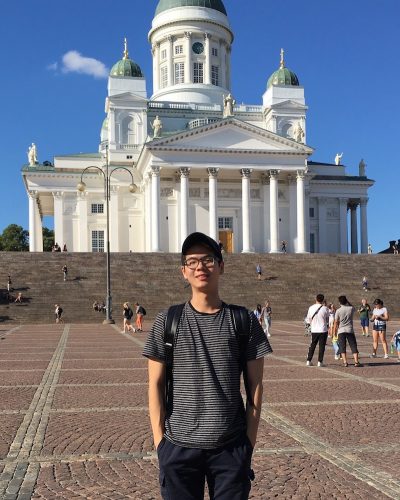Reporting on the Real Story of Sami Youth in Helsinki
By Rebecca Goldfine
The research Cheng-Chun “Kevin” Yu ’19 is working on this summer in Finland could, he hopes, help to dispel stereotypes about the Sámi, Europe’s only recognized indigenous people living across Norway, Sweden, Finland and Russia. “One of the things I wanted to tackle is the romanticized notion of Sámi being connected to the lands of their ancestors,” Yu said recently via Skype from Helsinki.
The Sámi, he continued, are more than reindeer herders living in harmony with nature above the Arctic Circle. In reality “more than half of Finland’s indigenous communities live in urban areas,” Yu said, where they struggle with issues such as homelessness at a higher rate than the non-indigenous population.
Yet despite this, much of the research and policy focused on the Sámi continue to be geared toward the northern communities. “I hope my research can shatter stereotypes and encourage other researchers to look at indigenous people in urban areas,” Yu said.
Yu has a Lifson Family Summer Research Fellowship and a Riley Research Grant from Bowdoin to conduct an ethnography of Sámi youth in Helsinki. Through interviews—which might become part of a documentary he makes—he is exploring how young Sámi, between the ages of eighteen and twenty-four, “navigate their identity and indigeneity,” and is looking at how their sense of self can “alter, change or disappear…based on their location.” His fellowship is one of almost 300 awarded to Bowdoin students during the summer to support research, projects, or internships.
Yu, who is majoring in government and anthropology with a concentration in Arctic studies, first became interested in the Sámi people after he heard a talk by Susan Kaplan, his project advisor. Kaplan is a professor of anthropology at Bowdoin and director of the Peary-MacMillan Arctic Museum and Arctic Studies Center.
“I just stumbled upon a presentation by Susan Kaplan my first year at Bowdoin,” Yu said. “She was speaking about how indigenous communities in the Arctic were not being heard, despite the rapid pace of climate change and political change.”
The moment was fortuitous for Yu because he had been seeking a subject onto which he could focus his academic interests and his humanitarian ideals. “I have always been interested in working with communities that don’t have the resources or power to work with national or state governments,” he explained. He knew almost instantly that he wanted to “to help [northern communities] build their capacity to fight for their rights.”
Yu was first inspired to work with disenfranchised people as a high schooler in China. (He was born in South Korea to a Taiwanese father and a Korean mother then moved to China when he was young.) He was the leader of a student club that raised money to sponsor the education of rural girls. “This is the type of work I want to do,” he said he realized at the time — that is, helping people, particularly young people.
Last spring, as a junior, Yu studied abroad in Finland, attending the University of Lapland. He worked as a research assistant at the university’s Arctic Centre—and as an elf at a Santa Claus theme park. “I was able to gather real-life interviews, as well as live the Christmas fantasy in the land of Santa Claus,” he joked.
During his study abroad, he narrowed down his research interest to urban Sámi youth. His study-abroad experience was “wonderful,” he said, because not only did he set up the foundation for his self-designed ethnography, but he also discovered an area he could see himself working in for, say, “ten, twenty years, or for the rest of my life.”